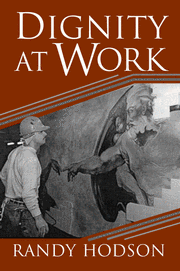Book contents
- Frontmatter
- Contents
- List of Figures and Tables
- Preface
- Part I Dignity and Its Challenges
- 1 Four Faces of Working with Dignity
- 2 Toward a Theory of Dignity
- 3 Measuring the Subtle Realms of Work
- Part II The Practice of Dignity
- Part III The Future of Dignity
- References
- Appendix A A Brief History of the Workplace Ethnography (W.E.) Project
- Appendix B Workplace Ethnography Data Set
- Appendix C Supplemental Tables
- Index
3 - Measuring the Subtle Realms of Work
Published online by Cambridge University Press: 28 August 2009
- Frontmatter
- Contents
- List of Figures and Tables
- Preface
- Part I Dignity and Its Challenges
- 1 Four Faces of Working with Dignity
- 2 Toward a Theory of Dignity
- 3 Measuring the Subtle Realms of Work
- Part II The Practice of Dignity
- Part III The Future of Dignity
- References
- Appendix A A Brief History of the Workplace Ethnography (W.E.) Project
- Appendix B Workplace Ethnography Data Set
- Appendix C Supplemental Tables
- Index
Summary
Working with dignity is a central motivation for workers. The founders of sociology, however, were only secondarily concerned with workers' active struggles to achieve dignity. They focused on the social structures that limit workers' lives and undermine their dignity and well-being. The concepts and theories they developed to understand social structures of exploitation, anomie, and excessive rationality have given direction to sociology for over a century.
But workers are not passive victims of social structures. They are active agents in their own lives. It is through active agency that workers realize dignity at work in the face of the many challenges they confront (Armstrong 1989). The question before us is: “How are we to study the quest for dignity across diverse work settings?” An answer to this question is provided by the systematic analysis of the existing body of ethnographic studies of the workplace.
Contemporary sociological methods reproduce many of the limits of our leading theories. Structures are studied in detail, but agency is routinely slighted. Surveys ask employees about the organization of their workplaces and their attitudes about work, but little is asked about the behaviors through which they adapt to, challenge, and make sense out of the structures they confront. For this reason, workers' views are frequently missing from discussions about what is right or wrong in the contemporary workplace (Freeman and Rogers 1999; Juravich 1985:5).
Employees' voices are given a more sustained hearing in ethnographic accounts of the workplace.
- Type
- Chapter
- Information
- Dignity at Work , pp. 50 - 80Publisher: Cambridge University PressPrint publication year: 2001



